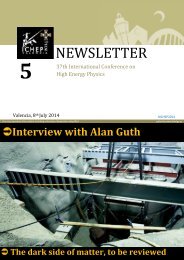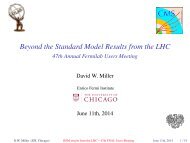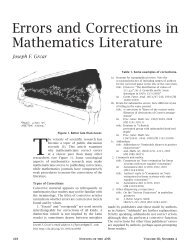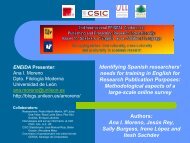PW_mar13_sample_issue
PW_mar13_sample_issue
PW_mar13_sample_issue
Create successful ePaper yourself
Turn your PDF publications into a flip-book with our unique Google optimized e-Paper software.
News & Analysis<br />
People<br />
Steven Chu steps down as US energy secretary<br />
The Nobel laureate Steven Chu has<br />
announced he is to resign as US<br />
energy secretary. When Chu departs,<br />
which as Physics World went to press<br />
was expected to be by the end of February,<br />
he will have served in the post<br />
for four years – longer than any of the<br />
14 previous heads of the Department<br />
of Energy (DOE). Chu now plans to<br />
return to “an academic life of teaching<br />
and research” in California.<br />
Politically independent, Chu<br />
received plaudits from Democrats<br />
and environmentalists during his<br />
time as energy boss, which spanned<br />
the whole of President Barack Obama’s<br />
first term in office beginning<br />
in 2008. “Steve helped my administration<br />
move America towards<br />
real energy independence,” Obama<br />
said in a statement. “Over the past<br />
four years we have doubled the use<br />
of renewable energy, reduced our<br />
dependence on foreign oil and put<br />
our country on a path to win the<br />
global race for clean-energy jobs.”<br />
In a letter to DOE staff, Chu noted<br />
his successes in office, such as funding<br />
the Advanced Research Projects<br />
Agency–Energy – a programme<br />
to promote and fund research and<br />
development in novel energy technologies.<br />
The agency’s work in<br />
areas such as improving batteries<br />
for electric vehicles and developing<br />
manufacturing technologies for<br />
solar cells has drawn plaudits across<br />
8<br />
the board, as did his “SunShot initiative”<br />
– an effort to increase US use<br />
of renewable-energy technologies –<br />
that began progress towards a goal of<br />
reducing the cost of solar power to $1<br />
per watt. “Secretary Chu has led the<br />
energy department at a time when<br />
our nation made the single largest<br />
investment ever in clean energy<br />
and doubled its use of renewables,”<br />
stated Gene Karpinski, president of<br />
the League of Conservation Voters.<br />
Yet Chu also became a controversial<br />
figure, facing heavy criticism<br />
from Republicans, deniers of climate<br />
change and some members of the<br />
business community. Critics focused<br />
on occasional failures of Chu’s initiatives,<br />
such as Solyndra – a solar-cell<br />
manufacturer that went bankrupt<br />
after receiving $535m in DOE loan<br />
Back to Earth<br />
Canadian astronaut<br />
Steve MacLean has<br />
resigned as<br />
president of the<br />
Canadian Space<br />
Agency to be<br />
involved in a new<br />
quantum-physics<br />
venture in Waterloo.<br />
Back to the lab<br />
Nobel laureate<br />
Steven Chu says that<br />
he will now return to<br />
“an academic life of<br />
teaching and<br />
research” in<br />
California.<br />
a spokesperson from the Perimeter<br />
Institute declined to give any. In a<br />
statement the institute said only that it<br />
was “very pleased that the innovation<br />
and technology cluster in the Waterloo<br />
region has attracted someone of Steve<br />
MacLean’s calibre” and that it looked<br />
forward “to collaborating with him and<br />
other partners who are building the<br />
quantum valley”.<br />
Information on MacLean’s plans<br />
was also scarce at the University of<br />
Waterloo, which is home to the new<br />
$100m (C$160m) Mike and Ophelia<br />
Lazaridis Quantum-Nano Centre that<br />
was opened by Stephen Hawking last<br />
year, as well as at Communitech,<br />
a Waterloo-based hub that aims to<br />
commercialize technologies. Both<br />
physicsworld.com<br />
guarantees – as well as A-123 Systems,<br />
an innovative battery maker<br />
that went bust before being rescued<br />
by a Chinese conglomerate.<br />
Daniel Kish, senior vice-president<br />
of the Institute for Energy Research,<br />
a Washington DC-based non-profit<br />
corporation, asserted that the emphasis<br />
on renewables has cost jobs. “The<br />
policies and priorities of Chu’s energy<br />
department have benefited our<br />
global competitors and intensified<br />
the economic pain felt by millions<br />
of unemployed Americans,” he says.<br />
Chu responded to those criticisms in<br />
his letter to DOE’s employees. “The<br />
truth is that only 1% of the companies<br />
we funded went bankrupt,” he noted.<br />
“The test for America’s policy-<br />
makers will be whether they are<br />
willing to accept a few failures in<br />
exchange for many successes.”<br />
The Obama administration will<br />
now nominate a successor, with the<br />
Democrat politicians Bill Ritter of<br />
Colorado, Jennifer Granholm of<br />
Michigan and Christine Gregoire of<br />
Washington state as top favourites.<br />
Yet there is a possibility that Chu’s<br />
successor will be another scientist:<br />
theoretical physicist Ernest Moniz<br />
of the Massachusetts Institute of<br />
Technology, who served as undersecretary<br />
of energy for former US<br />
president Bill Clinton.<br />
Peter Gwynne<br />
Boston, MA<br />
Quantum physics<br />
Plans for departing Canadian space chief kept under wraps<br />
The head of the Canadian Space Agency<br />
(CSA), Steve MacLean, quit as president<br />
last month after revealing he is planning<br />
to join a new quantum-physics venture in<br />
Waterloo. The venture will be led by Mike<br />
Lazaridis, who co-founded Research<br />
In Motion – the company behind the<br />
BlackBerry smartphone – and later set<br />
up the prestigious Perimeter Institute<br />
for Theoretical Physics, also in Waterloo.<br />
Although details of the initiative<br />
are being kept under tight wraps, it is<br />
known that the new joint effort between<br />
Lazaridis and MacLean will be separate<br />
from the Perimeter Institute’s activities,<br />
which focus on areas such as quantum<br />
gravity, quantum information and<br />
quantum fundamentals. But when asked<br />
for more details on MacLean’s plans,<br />
NASA/JSC<br />
DOE<br />
institutions told Physics World they had<br />
no knowledge of the new initiative, while<br />
MacLean himself did not respond to an<br />
interview request.<br />
MacLean received a BSc in physics in<br />
1977 and a PhD in physics in 1983 from<br />
York University in Toronto. That year he<br />
was also selected as one of the first<br />
six Canadian astronauts, going on two<br />
missions to space in 1992 and 2006. On<br />
the 1992 flight MacLean tested a laservision<br />
system, a predecessor to robotic<br />
arms such as the Canadarm2 that is<br />
currently used on the International<br />
Space Station to capture spacecraft. In<br />
2008 he was named CSA president for a<br />
five-year term.<br />
Elizabeth Howell<br />
Toronto<br />
Physics World March 2013








